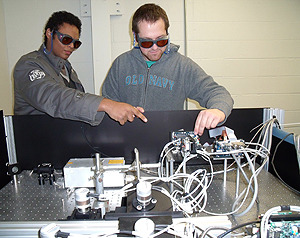Bachelor of Science
 Compared to a Bachelor of Arts, the Bachelor of Science includes more research and technical experience and is a good
choice for those who want to continue to graduate school and focus on a research career. Students can investigate a variety of topics in detail, such as how quantum mechanics
limits Moore's law to where the atoms making up your body were created in the universe.
The department has four different B.S. concentrations: physics, applied physics, biomedical physics and astrophysics.
Compared to a Bachelor of Arts, the Bachelor of Science includes more research and technical experience and is a good
choice for those who want to continue to graduate school and focus on a research career. Students can investigate a variety of topics in detail, such as how quantum mechanics
limits Moore's law to where the atoms making up your body were created in the universe.
The department has four different B.S. concentrations: physics, applied physics, biomedical physics and astrophysics.
An integral portion of the B.S. program is student involvement in research projects in the areas of astrophysics, atomic physics, biophysics, physics of thin films, surfaces and plasmas, applied physics and photovoltaics. Our faculty have outstanding academic credentials and a solid record of scholarly accomplishments. Faculty research programs are supported by grants from federal agencies such as NSF, DOE, ONR, NREL, and NASA, as well as private industry. For the last several years, UToledo has been one of a selected set of national sites supported by the NSF for undergraduate summer research participation, the REU program. Students will have access to the department's facilities, which include high-power lasers, positive and negative ion accelerators, and the Ritter Observatory's 1-meter telescope. A high-speed network provides access to the University's mainframes and to supercomputers off-campus.
This information applies to students with Fall 2016 catalog entry or later. The B.S. in physics requires 120 credit hours. The B.S. consists of a core program that all students must complete and a choice of
one concentration. The core program contains 34 hours of physics courses and 29 hours
of related-area courses; the concentration must contain an additional 6-20 hours of
physics and related courses. Another nine hours of courses from natural sciences,
mathematics, or engineering are recommended.
Physics core courses: PHYS 2130, 2140, 3310, 3410, 4210, 4230, 4240, 4310, 4920, 4950, and 4 hours of
PHYS4910 are required. With department approval, a student may substitute PHYS 2070,
2080 and 2100 for PHYS 2130 and 2140. The introductory course PHYS 1910 is also strongly
recommended for all physics majors.
The following related courses are also required: CHEM 1230, CHEM 1280, EECS 1500,
MATH 1830 or 1850, MATH 1840 or 1860, MATH 1890 or 2890, MATH 2850, MATH 2860, and
MATH 3610. One additional course chosen from major-level courses in biology, chemistry,
or environmental sciences (3-4 hrs).
Concentrations: The student must choose one of the following concentrations:
-
- Physics: PHYS 3180, and either 4580 or 4780.
- Astrophysics: ASTR 2010, 2020, 3880, 4810, 4820 and 4880.
- Applied Physics: PHYS 3180, 3610, 4510, and either 4580 or 4780, plus three hours of appropriate courses from physics or engineering, chosen with the advisor’s approval.
- Biomedical Physics: PHYS 3180, 4430, 4440, and either 4580 or 4780; and related courses BIOL 2150 and 2160 (which satisfies the related major-level course requirement above), plus EXSC 2510, 2520, 2530 and 2540 (or the alternate sequence EXSC 2460, 2470, 2560, and 2570).
- In addition to the above requirements, students should consider the following recommended electives: MATH 4740 and 4750.
These requirements can be completed over four years as shown in the UToledo Course Catalog under Plan of Study.


